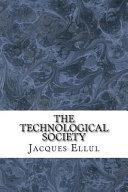Quotes from book
The Technological Society

The Technological Society is a book on the subject of technique by French philosopher, theologian and sociologist Jacques Ellul. Originally published in French in 1954, it was translated into English in 1964.

“The individual who is the servant of technique must be completely unconscious of himself.”
The Technological Society (1954)

“Journalistic content is a technical complex expressly intended to adapt man to the machine.”
Source: The Technological Society (1954), p. 96

“It tends on the contrary, to create a completely independent technical morality.”
Source: The Technological Society (1954), p. 97
Context: A principal characteristic of technique … is its refusal to tolerate moral judgments. It is absolutely independent of them and eliminates them from its domain. Technique never observes the distinction between moral and immoral use. It tends on the contrary, to create a completely independent technical morality.
Here, then, is one of the elements of weakness of this point of view. It does not perceive technique's rigorous autonomy with respect to morals; it does not see that the infusion of some more or less vague sentiment of human welfare cannot alter it. Not even the moral conversion of the technicians could make a difference. At best, they would cease to be good technicians. This attitude supposes further that technique evolves with some end in view, and that this end is human good. Technique is totally irrelevant to this notion and pursues no end, professed or unprofessed.

Source: The Technological Society (1954), p. 97
Context: A principal characteristic of technique … is its refusal to tolerate moral judgments. It is absolutely independent of them and eliminates them from its domain. Technique never observes the distinction between moral and immoral use. It tends on the contrary, to create a completely independent technical morality.
Here, then, is one of the elements of weakness of this point of view. It does not perceive technique's rigorous autonomy with respect to morals; it does not see that the infusion of some more or less vague sentiment of human welfare cannot alter it. Not even the moral conversion of the technicians could make a difference. At best, they would cease to be good technicians. This attitude supposes further that technique evolves with some end in view, and that this end is human good. Technique is totally irrelevant to this notion and pursues no end, professed or unprofessed.

“Technique is totally irrelevant to this notion and pursues no end, professed or unprofessed.”
Source: The Technological Society (1954), p. 97
Context: A principal characteristic of technique … is its refusal to tolerate moral judgments. It is absolutely independent of them and eliminates them from its domain. Technique never observes the distinction between moral and immoral use. It tends on the contrary, to create a completely independent technical morality.
Here, then, is one of the elements of weakness of this point of view. It does not perceive technique's rigorous autonomy with respect to morals; it does not see that the infusion of some more or less vague sentiment of human welfare cannot alter it. Not even the moral conversion of the technicians could make a difference. At best, they would cease to be good technicians. This attitude supposes further that technique evolves with some end in view, and that this end is human good. Technique is totally irrelevant to this notion and pursues no end, professed or unprofessed.